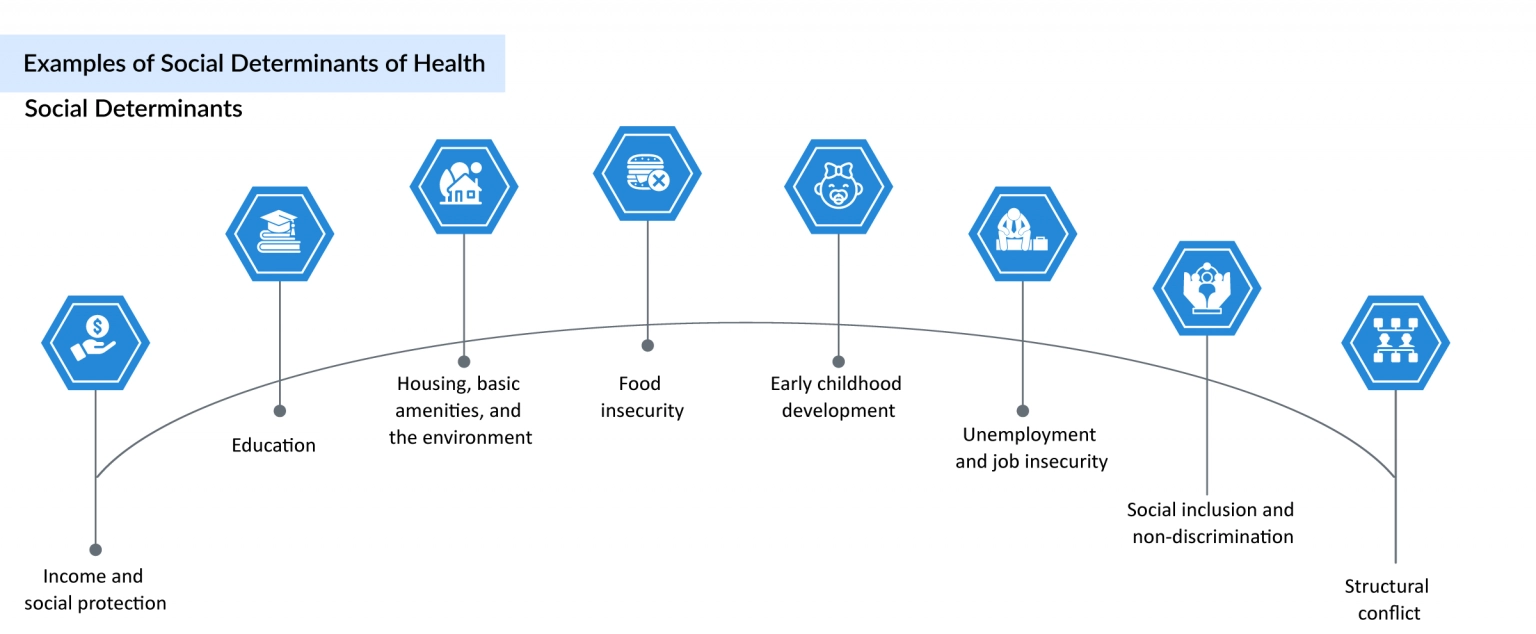The social determinants of health are non-medical influences that strongly affect how people live and how long they stay healthy. These include factors such as financial stability, education, employment opportunities, neighborhood conditions, healthcare access, and social support networks. Together, they create the foundation that allows individuals to thrive or, in some cases, exposes them to risk. For example, people living with steady income, secure housing, and access to healthy food have a much greater chance of maintaining good health than those struggling with poverty, unstable housing, and limited resources. This contrast makes clear that medical care alone cannot erase the disadvantages created by difficult living conditions. The relevance of SDOH lies in the fact that they often outweigh traditional medical interventions. Health is shaped by five main influences: biology, behavior, environment, social factors, and access to care. These influences constantly interact. For example, someone may have access to medication for a chronic illness but still struggle with management if they cannot afford healthy meals or lack reliable transportation to medical appointments. Conversely, someone with strong community support and stable resources can manage the same condition far more effectively. Improving social determinants can therefore prevent many illnesses, improve treatment success, and raise overall quality of life. The COVID-19 pandemic clearly demonstrated how important these determinants are. The social determinants of health model helped explain why disadvantaged communities experienced higher infection rates and mortality. Families in crowded homes found it impossible to isolate. Many people worked in essential roles that increased exposure, while others lacked internet access to use telemedicine or stay informed. These realities revealed that pandemics are not only medical events but also social ones. The virus spread faster and caused more harm where inequality was deepest, highlighting the urgent need to integrate social considerations into public health strategies. The pharmaceutical industry has begun to recognize the importance of these realities. Beyond producing medicines, companies are now looking at barriers that prevent patients from benefiting fully from their treatments. Real-world data show that the types of social determinants of health play a direct role in treatment adherence and effectiveness. A patient may fail to complete treatment not from unwillingness but from cost barriers, lack of transportation, or inadequate knowledge about their condition. To help address these gaps, pharmaceutical companies have expanded patient assistance programs, invested in education initiatives, and partnered with local organizations. While they cannot solve all systemic issues, their involvement is vital in removing obstacles that directly impact patient health. Moving forward, healthcare systems must integrate social and clinical approaches more effectively. Screening patients for food insecurity, unstable housing, or social isolation and connecting them to supportive services can prevent avoidable complications. Policymakers and insurers are beginning to see the value in supporting such efforts, as healthier populations reduce long-term costs. This approach reflects a shift from reactive, treatment-based care toward proactive, prevention-focused strategies. However, achieving these changes requires collaboration between sectors. Governments, healthcare providers, private industries, and communities must all contribute to building environments that support health. In conclusion, social determinants of health are not secondary issues but fundamental to health outcomes. The pandemic revealed their power, showing that inequities in income, housing, and healthcare access can turn a public health crisis into a wider social disaster. The growing involvement of the pharmaceutical industry shows that solutions require cooperation across sectors. By addressing both medical needs and the social conditions that shape health, society can build a more inclusive and effective system, ensuring that everyone has a fair chance to live healthier, longer lives.
Latest Reports Offered by Delveinsight:
Holter Monitor Market | Bulimia Nervosa Market | Decompensated Cirrhosis Market | Elastomeric Pump Market | Microscopy Device Market | Temporomandibular Disorders Market | Fetal And Neonatal Monitoring Devices Market | Benign Prostatic Hyperplasia Market | India Healthcare Report | Metrorrhagia/dysfunctional Uterine Bleeding Market | Transdermal Drug Delivery Devices | Drug Hypersensitivity Market | Energy Based Aesthetic Devices Market | Fap Inhibitor Market | Liquid Biospy For Cancer Diagnostics Market | Tendonitis Market | Transcatheter Treatment Market | Antibody Drug Conjugate Market | Bone Neoplasms Market | Bronchiolitis Obliterans Syndrome Bos Market
About DelveInsight
DelveInsight is a trusted provider of life sciences and pharmaceutical market research and consulting, offering actionable insights that empower organizations to make informed decisions. With a commitment to delivering strategic intelligence, DelveInsight serves as a key partner to global pharmaceutical, biotechnology, and healthcare companies looking to excel in an evolving market landscape.
Contact Us
Kanishk
Email: kkumar@delveinsight.com

